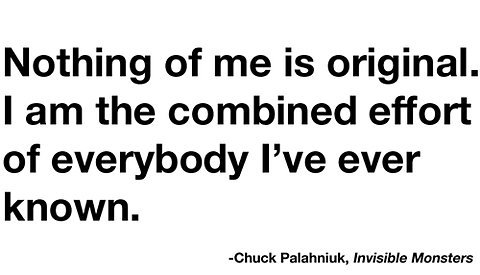In short, Mandy Moore's character (Jamie Sullivan) is the "good girl" while Shane West's (Landon Carter) character is the usual "bad boy", the rebel. Eagleton makes Lacan's theory a little more clear in terms of the opposite relationships by stating "that identities come about only as a result of difference--that one term or subject is what it is only by excluding another"(144). So to look at Jamie and Landon's relationship, it would only seem fitting that their souls are bound to live in eternity because of the extreme opposition both hold in their personalities. Good and bad become ying and yang which thus creates a timeless love for them to share. In looking at relationships before they meet this end, it would be best to note the dating process: one person does not simply go about choosing their soulmate in a neat fashion. In fact, most people date a series amount of other people before they in fact find this "complete reality". As Eagleton puts it, "instead of being able to posses anything in its fullness, the child will now simply move from one signifier to another, along a linguistic chain which is potentially infinite"(145). So perhaps the reason a person may continue to date but never fully "complete" themselves (in terms of love), would be because no one opposition has completed their reality, or in other words, their identity. The cliche statement "I am not complete without you"--is certainly true, then. According to Lacan, people can only identify themselves and their desires wholly by their Others. And it is that, that Lacan continues to note that "we desire what others...unconsciously desire for us; and desire can only happen because we are caught up in linguistic, sexual and social relations--the whole field of the 'Other'--which generate it"(151). To further make this statement clear, while in the movie Jamie didn't feel the need to change Landon's bad boy image, her unconscious desires of wanting to make him a better person made him desire that change. He in turn, did change for the better as he spent more and more time with her. Time grew into love and love grew into identity. Landon was no longer himself without Jamie. However, Landon's desire was to make Jamie love him and while she was relcutant to it at first, by him loving him, she in turn fell in love with him.
George Lakoff and Mark Johnson collaborated on writing a book called, "Metaphors We Live By," whose ideas are generated solely on the thought that our language shapes our cultural beliefs/identities. It is no doubt that they have taken into account Lacan's theories. They break metaphors down in to the INs and OUTs, UPs and DOWNs, thus further proving what Eagleton notes as "we move among substitutes for substitutes, metaphors of metaphors, never able to recover the pure (if fictive) self-identity and self-completion which we knew in the imaginary"(146). Because language is constantly changing, must mean that our identities are constantly changing, too. The way in which we use language, then, is in the way in which we use each other to identify ourselves. It is an infinite cycle that Plato would be proud of because no one person can truly get to the ideal forms of their language or even of themselves. And while Jamie and Landon's relationship seems infinite, after her death it would only be fitting that Landon marry another woman who fills this "lack" that Jamie had left him. In language there is always an emptiness, and in life there is also that same void.

Eagleton, Terry, trans. Literary Theory: An Introduction. Minneapolis: The University of Minnesota, 2008.

No comments:
Post a Comment